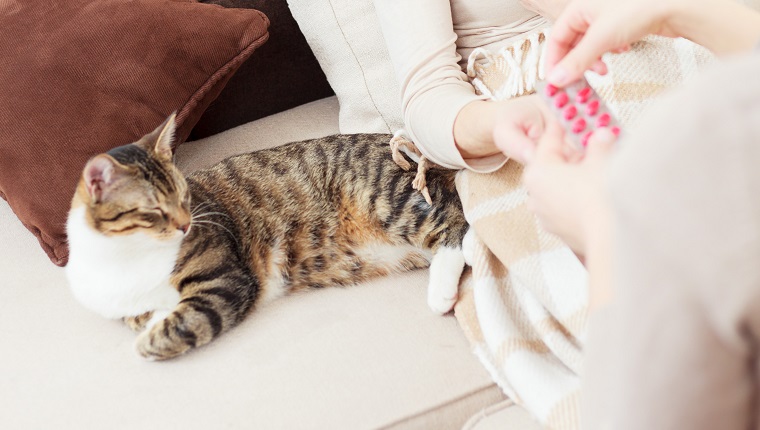Benadryl an antihistamine medicine that cats might take primarily to treat a range of allergies and motion sickness. It’s actually a brand name for the generic drug diphenhydramine.
The medication works by calming the symptoms that are caused by histamine. It comes in tablet or syrup form, and you can purchase it over-the-counter without a prescription from a veterinarian.
However, you must consult your vet before you give this or any drug to your cat. Some formulas may not be safe for cats, interact poorly with other medications, or cause side effects in some felines. Closely follow your vet’s instructions for the correct and safe dosage and frequency.
Here’s what you should know about the uses, dosage, and side effects of Benadryl for cats.
Uses Of Benadryl For Cats
Veterinarians normally advise the use of Benadryl for cats to treat a range of allergies and allergic reactions that felines might suffer from. They may also advise using it to treat motion sickness issues that a cat might experience, along with bouts of vomiting.
Some pet parents rely on the drug for its sedative effects, especially in treating forms of anxiety, like noise anxiety during loud events, such as fireworks displays or thunderstorms. There are, however, several more effective sedative treatments that vets may advise, so always consult your vet before giving your cat Benadryl.
The medication works by negating the effects of histamine, which can lead to symptoms including sneezing and watery eyes.
Dosage Of Benadryl For Cats

The following is a guideline for typical use of the drug in cats and must not replace your veterinarian’s advice for your individual pet.
Veterinarians generally prescribe Benadryl for cats at a dosage of about 1 milligram per pound of the cat’s body weight.
Your veterinarian can help you figure out the correct dosage and how to divide any tablets or measure the liquid form of the drug. The amount of Benadryl your vet advises will also depend on the severity of your cat’s symptoms.
Always follow the exact dosage and administration instructions from your vet. This includes the length of time you should give the medicine to your cat.
Side Effects Of Benadryl For Cats
Benadryl can produce a range of side effects in cats. The most common side effects that appear in cat are difficulties urinating and a sense of drowsiness.
If you suspect your cat has taken too much of the medication and is suffering from an overdose, then you must contact your emergency veterinarian right away.
Has your cat ever taken Benadryl? Did it help treat their allergies or help them relax? Let us know in the comments section below!




